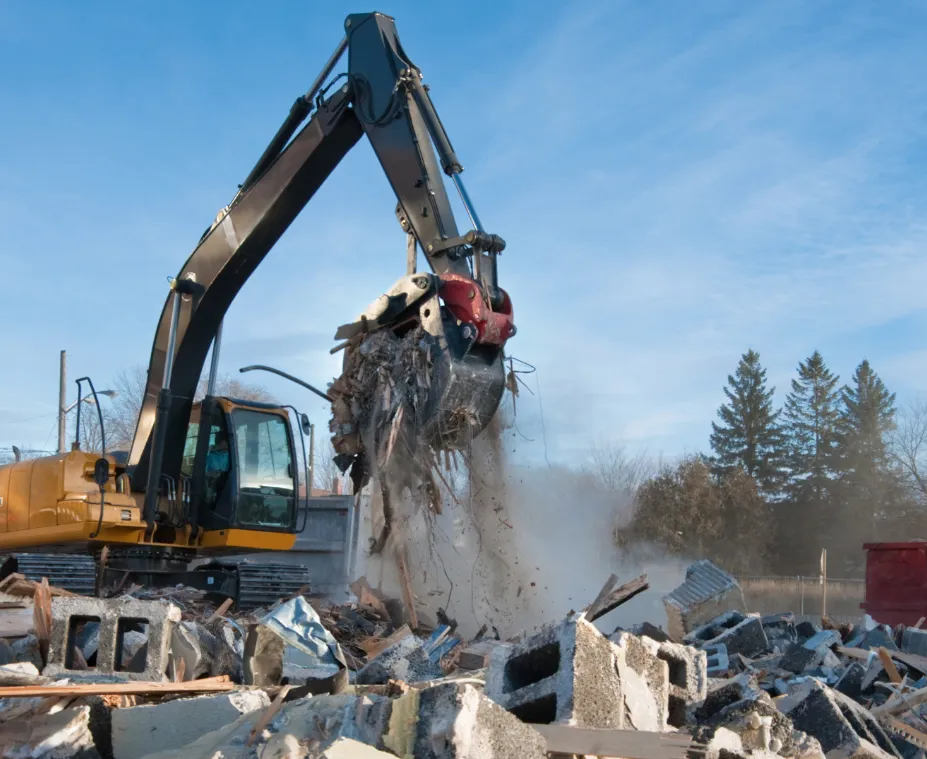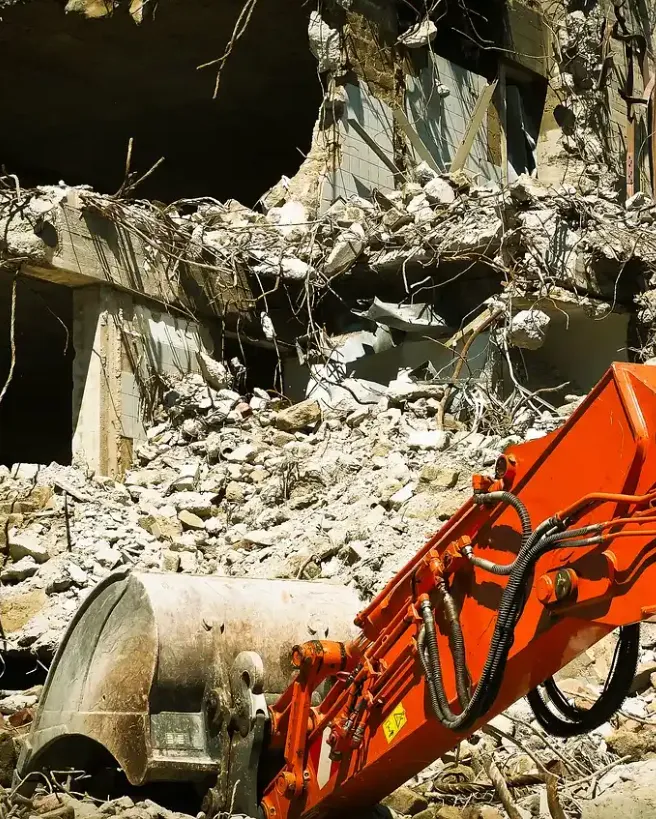
Demolition Companies Near ,
Why Demolition Isn’t as Simple as Knocking Things Down
If you’re considering a demolition project, there’s a good chance you’re feeling both excitement and uncertainty. Maybe you’re finally ready to clear the way for a new space, or perhaps you’re tackling a property that’s seen better days. Regardless, one thing’s for sure—demolition isn’t as simple as it seems.
Sure, it may look straightforward from the outside. Grab a few tools, bring in some heavy machinery, and break down those walls, right? But the reality is much more complex. Demolition is an intricate process that involves careful planning, regulatory navigation, and a deep understanding of safety. And if anything goes wrong? You could be left facing unexpected delays, added costs, and even legal headaches.
This page aims to answer the questions you may not even know you have, preparing you for what’s ahead so that you can make informed decisions and move forward with confidence.
How Can We Help?

is Committed to superior quality and results!

AVOID COSTLY MISTAKES:
Do NOT hire an excavating contractor without first reading our free guide:
The ULTIMATE Excavation & Septic "Success Guide."


Understanding Demolition Costs: What You’re Really Paying For
Demolition costs are more than just the fee for a bulldozer and crew. From the necessary permits to labor, disposal, and possible asbestos removal, each step adds to the price. Many people are shocked when they learn how many factors affect the overall cost.
Cost Factors: Location, Permits, Building Size, and Material Types
Costs can vary significantly based on where you are. For instance, a demolition project in an urban area with strict regulations will likely cost more than a similar job in a rural setting. Permits alone can be a large expense, not to mention the variations in building materials. Older buildings with hazardous materials require specialized handling, which adds to the cost.
Why “Cheapest” Can End Up Costing You More
You may find some “too-good-to-be-true” offers, but cutting corners in demolition often leads to more expenses down the line. An inexperienced team could overlook key steps, leaving you to deal with leftover debris or, worse, structural issues. When it comes to demolition, investing in expertise pays off.
Common Demolition Challenges and How to Avoid Them
Unexpected Obstacles: Hazardous Materials, Structural Surprises, and Environmental Concerns
Demolition can reveal unexpected issues lurking within a structure. Lead paint, asbestos, and even underground tanks might be hiding, waiting to complicate things. Handling these elements requires skilled professionals trained in hazardous materials.
Permits and Legal Issues: Navigating Red Tape
Every demolition project requires permits, and each one comes with its own set of regulations and paperwork. An experienced team can help you navigate these waters efficiently, saving you from potential fines and delays.
How Experienced Pros Prevent Costly Mistakes
Seasoned demolition teams know what to look for and how to avoid common pitfalls. By hiring professionals, you can rest assured that they’ll handle every detail, from permits to clean-up, with minimal disruption to your timeline and budget.
Demolition vs. Deconstruction: What’s the Right Choice?
Demolition: When Quick Removal Is a Priority
Demolition is all about speed. If your goal is to clear a site as quickly as possible, demolition is likely the best choice. This method prioritizes fast, effective removal.
Deconstruction: Reclaiming Materials and Minimizing Waste
Deconstruction is a more meticulous approach, focusing on salvaging and reusing materials. While it can take longer, deconstruction is often a sustainable choice, reducing landfill waste and potentially allowing you to save on disposal costs.
Comparing Costs, Timelines, and Environmental Impact
Each approach has its pros and cons. Demolition might be more affordable and quicker, while deconstruction can save valuable materials for future use. Choosing the right method depends on your goals, budget, and timeline.
See Our

✔️ Commercial Excavation
✔️ Residential Excavation
✔️ Demolition - Smaller Sheds, Barns , Mobile Homes, Single Family Homes
✔️ Dozer Work
✔️ Septic System Pumping
✔️ Septic Installs Traditional Systems
✔️ Septic Tanks - Plastic/Poly
✔️ Septic Tanks - Concrete
✔️ Septic Tank Installations
✔️ Septic Pumps And Septic Alarms
✔️ Pump Replacement
✔️ Lift Stations
Quality Services Launched FAST!

✔️ Drain Field Replacement
✔️ Forestry Mulching
✔️ Grading
✔️ Lot Clearing
✔️ French Drains
✔️ Sewer Repairs
✔️ Camera Inspections
✔️ Pipe Jetting And Thawing
✔️ Drainage Systems
✔️ Full Site Preparation
✔️ Grease Trap Pumping
✔️ Grease Trap Repairs
✔️ Grease Trap
✔️ Land Clearing
What Are You Waiting For?
What to Look for in Demolition Company Reviews
How to Spot Red Flags and Positive Signs in Reviews
Reviews can tell you a lot, but knowing what to look for is essential. Consistently positive feedback on handling challenges, clear communication, and prompt service are good signs. Conversely, complaints about surprise fees or poor site cleanup can signal trouble.
Understanding What Experienced Homeowners Prioritize in Their Feedback
Experienced customers tend to value efficiency, safety, and transparency. Pay attention to reviews that highlight these qualities, as they speak to a company’s commitment to quality and customer care.
Why a Solid Reputation Matters More Than Price Alone
When it comes to demolition, reputation often outweighs price. Hiring a well-regarded company with experienced staff can provide peace of mind, ensuring the job gets done right the first time.
The Best Types of Demolition for Different Projects
Residential, Commercial, and Industrial Demolition Needs
Every demolition project is unique. Residential demolition may involve tearing down a single-family home or a small structure, while commercial and industrial projects can encompass multi-story buildings or factories. Each type requires a different approach, with specific techniques and equipment suited to the job.
Partial vs. Full Demolition: Choosing the Best Approach
Not every project requires a total teardown. Partial demolition allows you to remove sections of a structure while keeping other areas intact. This approach can be beneficial for remodels and expansions, offering flexibility and cost savings.
Matching Your Project’s Needs to the Right Method
Selecting the right demolition method is crucial. Whether you need a clean slate or a partial remodel, a professional can guide you through your options, helping you find the best solution for your project.
The Final Step: Preparing for Life After Demolition
Site Preparation and Post-Demolition Considerations
After demolition, what’s left behind is a blank slate—but one that still requires careful planning. Proper site preparation is essential to ensure that the land is ready for the next phase, whether that’s construction or landscaping.
Recycling and Waste Management: Keeping the Process Green
A responsible demolition project doesn’t end when the building comes down. Recycling materials like concrete, metal, and wood can greatly reduce waste. If you’re looking for an environmentally friendly solution, consider working with a team that prioritizes recycling and sustainable practices.
Tips for Ensuring a Smooth Transition to Your Next Phase
Finally, make sure you have a clear plan for what comes next. From arranging debris removal to soil preparation, every detail contributes to the success of your post-demolition project.
Hours:
Extended hours by appointment only.
Address: